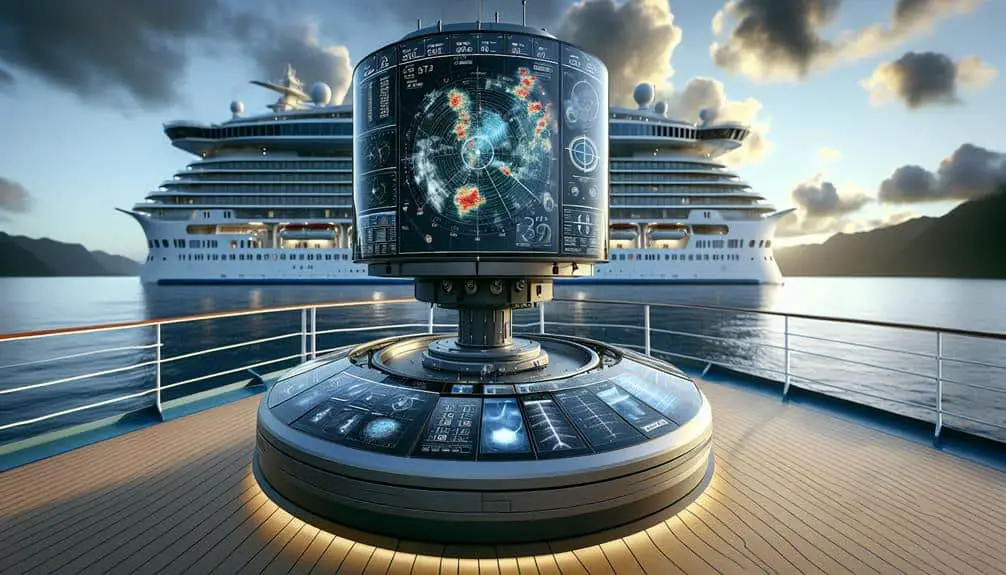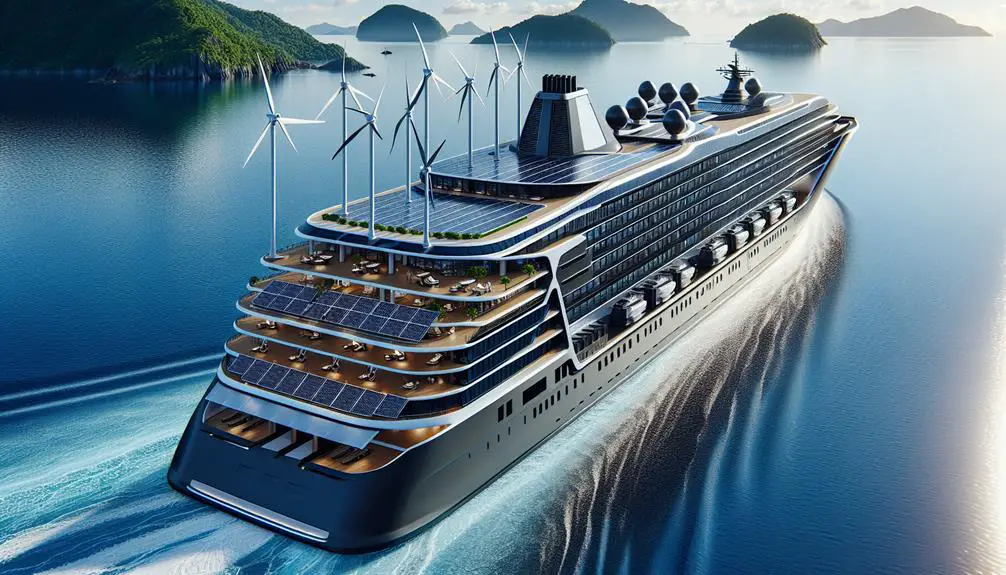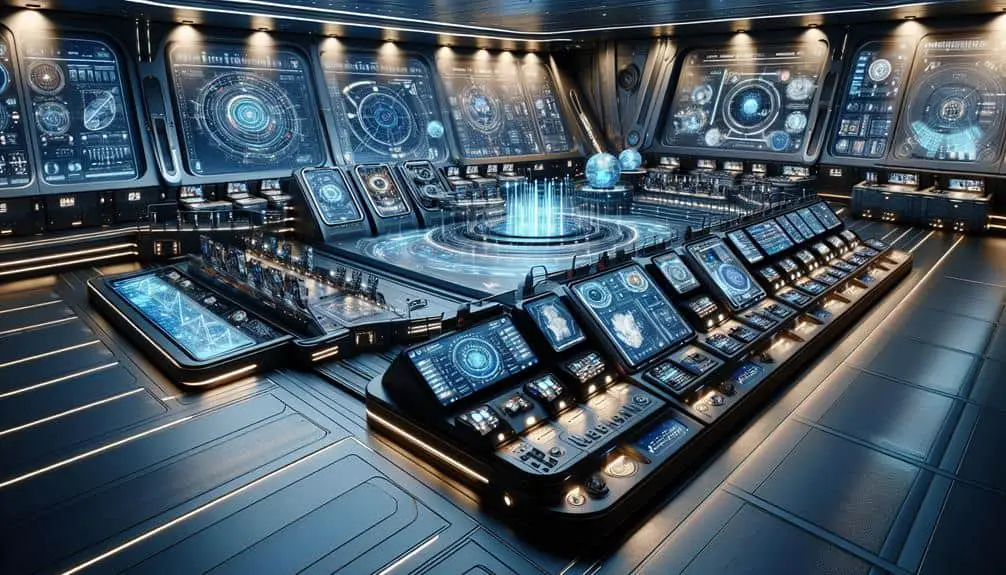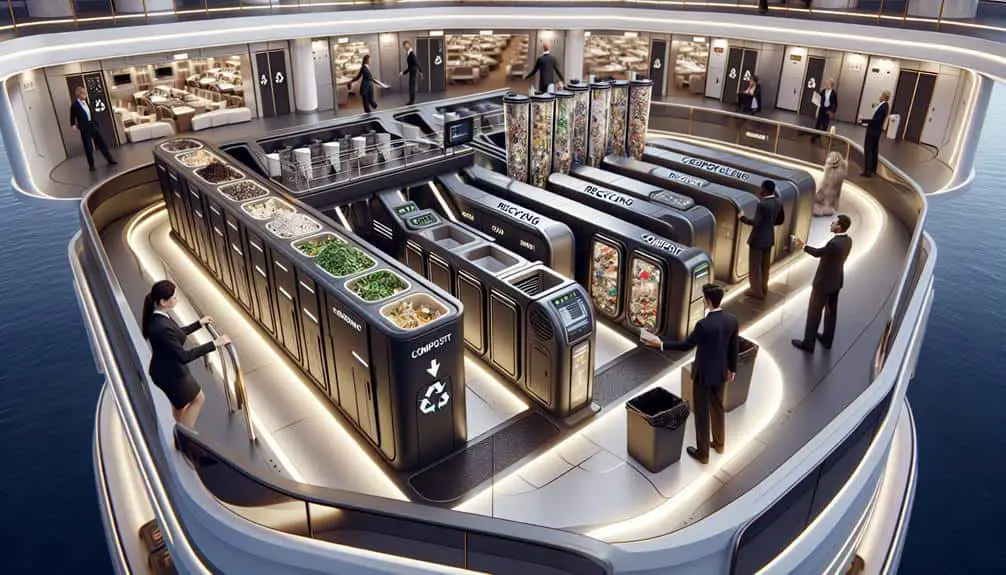Set sail on a cruise with assurance. State-of-the-art satellite technology and AI-driven models guarantee accurate real-time weather tracking. Sophisticated sensors gather onboard data for operational efficiency. Integration of real-time weather data helps in decision-making. Emergency preparedness systems prepare ships for adverse conditions. These innovative systems maximize safety and enhance your cruise experience.
Key Points
- Advanced Satellite Weather Tracking provides real-time weather monitoring over vast oceanic regions.
- AI-Powered Weather Prediction Models enhance forecasting accuracy and operational efficiency.
- Onboard Weather Monitoring Systems ensure safety with continuous analysis of meteorological data.
- Real-time Weather Data Integration enables informed decision-making for passenger safety.
- Weather Emergency Preparedness Technologies facilitate swift and effective response to adverse weather conditions.
Advanced Satellite Weather Tracking
Employ cutting-edge satellite technology to facilitate precise and real-time tracking of weather patterns for improved forecasting accuracy on cruises. Satellite imagery analysis plays a crucial role in comprehending weather dynamics over vast oceanic regions. By harnessing satellite data, cruise ships can monitor evolving weather conditions with high resolution and precision. This allows for the identification of key weather patterns such as cyclones, fronts, and atmospheric disturbances.
Weather pattern recognition algorithms analyze the intricate interaction of various meteorological variables captured by satellites. These algorithms can quickly detect patterns suggestive of potential storm formation or sudden shifts in weather conditions. By promptly identifying these patterns, cruise operators can make informed decisions to guarantee passenger safety and itinerary adjustments as necessary.
The integration of satellite imagery analysis and weather pattern recognition enhances the overall forecasting capabilities of cruise ships. This technology provides a thorough view of atmospheric conditions, empowering crews to navigate through diverse weather scenarios with heightened awareness and preparedness. Ultimately, the utilization of advanced satellite weather tracking systems elevates the safety and operational efficiency of cruises in dynamic maritime environments.
AI-Powered Weather Prediction Models
Harnessing the power of artificial intelligence, cruise ships can now leverage cutting-edge weather prediction models to enhance forecasting accuracy and guarantee peak operational efficiency. These AI-powered systems utilize machine learning algorithms and predictive analytics to process vast amounts of data from various sources such as satellites, weather stations, and historical weather patterns. By analyzing this data, the models can generate highly accurate weather predictions tailored to the specific routes and destinations of the cruise ships.
Vital learning algorithms play an essential role in these systems by continuously learning from new data inputs and refining their predictive capabilities over time. This adaptability allows the models to improve their accuracy and reliability, providing cruise operators with up-to-date and precise weather forecasts. Predictive analytics further enhance the effectiveness of these models by identifying patterns and trends in the data to forecast weather conditions with greater precision.
Incorporating AI-powered weather prediction models on cruises not only improves the safety and comfort of passengers and crew but also enables cruise lines to optimize their operations by making informed decisions based on reliable weather forecasts.
Onboard Weather Monitoring Systems
Onboard weather monitoring systems provide real-time meteorological data to guarantee operational efficiency and safety on cruise ships. These systems utilize advanced onboard sensor technology to collect and analyze weather data continuously. By integrating various sensors such as anemometers, barometers, thermometers, and hygrometers, these systems can monitor important weather parameters like wind speed, atmospheric pressure, temperature, and humidity. The onboard sensor technology enables the systems to detect changes in weather conditions promptly, allowing crew members to make informed decisions to secure passenger safety and comfort.
Furthermore, the weather data analysis conducted by these onboard systems helps in optimizing cruise routes to avoid adverse weather conditions, reducing fuel consumption, and enhancing overall operational efficiency. By leveraging real-time weather information, cruise operators can proactively adjust their schedules and activities to minimize disruptions caused by inclement weather. Overall, onboard weather monitoring systems play a crucial role in enhancing the cruising experience by providing accurate and timely weather information for informed decision-making.
Real-time Weather Data Integration
Integrating real-time weather data on cruises enhances operational efficiency and guarantees passenger safety by providing timely updates on changing meteorological conditions. To achieve this, cruise ships utilize advanced technologies that allow for seamless integration of weather data.
Here's how real-time weather data integration benefits cruise ships:
- Data Visualization: Implementing real-time weather data integration systems allows for the visualization of complex meteorological information in an easy-to-understand format.
- Predictive Analytics: By analyzing real-time weather data, cruise ships can leverage predictive analytics to forecast future weather patterns accurately.
- Enhanced Decision-making: Access to real-time weather data enables cruise ship captains and crew to make informed decisions promptly, ensuring the safety and comfort of passengers.
- Operational Efficiency: Integrating real-time weather data streamlines operational processes on cruise ships, optimizing routes and schedules based on current weather conditions, ultimately enhancing the overall efficiency of the voyage.
Weather Emergency Preparedness Technologies
Utilizing cutting-edge technologies, cruise ships are equipped with advanced weather emergency preparedness systems to guarantee swift and effective response during adverse meteorological conditions. These systems encompass a range of tools and protocols designed to enhance emergency response capabilities and guarantee passenger safety.
One key aspect of these technologies is their integration with highly accurate weather prediction systems. By utilizing real-time data and sophisticated forecasting models, cruise ships can proactively anticipate weather-related challenges and take preemptive measures to mitigate risks. This proactive approach enables crew members to make informed decisions promptly, such as altering the ship's course or adjusting schedules to avoid severe weather conditions.
Moreover, these emergency preparedness technologies often include communication systems that allow for seamless coordination among onboard personnel and authorities on land. This streamlined communication network facilitates efficient decision-making and swift implementation of emergency procedures, further enhancing the ship's overall readiness to handle weather-related crises. Essentially, the integration of advanced technologies into weather emergency preparedness systems equips cruise ships with the tools needed to navigate challenging meteorological situations with precision and effectiveness.
Frequently Asked Questions
How Do Cruise Ships Account for Weather Conditions That May Not Be Easily Detected by Advanced Satellite Weather Tracking Systems, Such as Localized Storms or Unpredictable Wind Patterns?
When sailing, cruise ships utilize onboard meteorological instruments to detect localized storms and erratic wind patterns. These systems provide real-time data allowing for immediate course adjustments and passenger safety. Advanced technology enhances voyage planning and weather monitoring.
Can Passengers Access Real-Time Weather Data on Their Personal Devices While on Board, and if So, What Platforms or Apps Are Typically Used for This Purpose?
You want to stay ahead of the storm? Personalized alerts keep you informed with cruise ship weather apps. Real-time data on your device. Prepare to navigate the high seas like a weather wiz!
Are There Any Specific Weather-Related Emergency Procedures or Protocols in Place on Cruise Ships, and How Are Passengers Informed or Trained on These Measures?
In the event of emergencies onboard, cruise ships have specific weather-related emergency procedures. Passengers are informed and trained on these measures through drills and safety briefings, ensuring everyone is prepared for potential weather hazards.
How Do Ai-Powered Weather Prediction Models Take Into Account the Unique Challenges of Forecasting Weather at Sea, Such as the Influence of Ocean Currents or the Lack of Land-Based Weather Stations?
When predicting sea weather, innovative technology blends with oceanography research. It's like having a meteorologist on each wave. AI models consider ocean currents, scarce land stations, and more. Prepare for forecasting mastery!
What Measures Are in Place to Ensure the Accuracy and Reliability of Onboard Weather Monitoring Systems, Especially in Remote or Challenging Maritime Environments?
To guarantee data accuracy in remote monitoring of maritime weather challenges, onboard systems employ advanced sensors and satellite technology. These systems continually analyze atmospheric conditions, vessel movements, and ocean data for reliable forecasting onboard cruises.




